
Christmas Holidays at Sea: 1 2 3 4 5 6 Next>>
Christmas Holidays at Sea in the Golden Age of Piracy, Page 2
Christmas with the English Navy
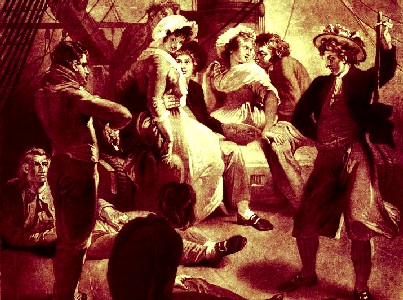
Engraver: William Ward - Sailors in Port (1798)
When possible, Christmas was a time for sailors to take a break and celebrate. English navy Clerk John Baltharpe provides some insight into the navy sailors activities on Christmas day in his poem about the Mediterranean voyage of the navy vessel St. David. In 1669, the ship was just leaving Alicante, Spain where he explained,
The Five and Twentieth as some say,
Of this Month called Christmas-day:
Our Fidler then did Play, and Sing,
At Cabin door, made Steerage ring.
With cheerful Voice, bid them good morrow,
I think that he did Verses borrow:
From some fam'd Poet, for he'd sing,
Brave merry Songs, made all to ring.1
So happy songs seemed to carry the day that year, with the crew perhaps limited to that because the ship had just gotten underway.
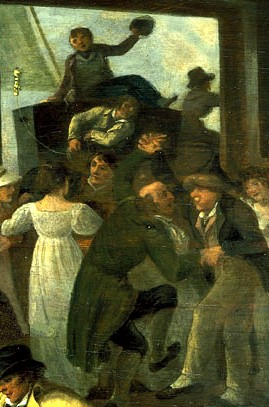
Artist: Julius Caeser Ibbetson
Celebrating Sailors Carousing at a Tavern
in
Portsmouth (1794)
(Or perhaps because Baltharpe didn't think couldn't find the right rhyme scheme for the food they ate.) The next year, his account of Christmas aboard the St. David was a bit more detailed.
Our Christmas we do keep at Sea,
Upon Decembers five and twentieth day,
But cause that it did happen on a Sunday,
Our Fidler plays on Saturday and Munday.
Some give him Money, some good Wine,
The Rogue doth tope his nose [drink to excess], till he is blind.
Instead of Rost-beef, and Plum-pies,
Good Houghs [hocks] of Bacon, doth us now suffice.
With Puddings mixt with Fruit and Oyl,
In furnace this same day we boyl:
Our Gunners Pudding made so great,
That twenty men could scarce it eat:
With Swords and Pistols, forth the Cook-room
They it convoy'd into the Gun-room:
Silk Flag, they also did display,
As they this Pudding fetcht away:
Which 'mongst our men, caus'd great laughter
The Ensign will be told on't after:
As he doth in his Wherry [small rowboat] row,
There doth this Pudden Ensign-bearer go:
Yet he the honour had to bear
A Flag before a Pudden rare. 2
Special food seems to have been a mainstay of Christmas at sea. A look back at the splendid meals that pastor Teonge recounted on the previous page testifies to this. Tales we have of officers celebrating the holiday during this period sometimes ran to more extravagent lengths.
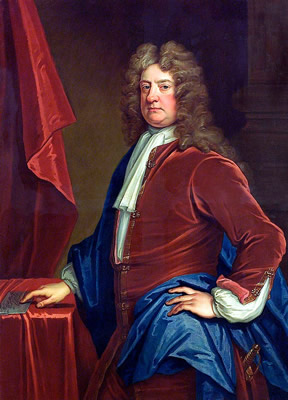
Artist: Thomas Gibson - Admiral Edward Russell (1715)
When Admiral Edward Russell was ordered by the Navy to spend Christmas in Cadiz, Spain in 1694, Russell was not pleased. Since he was stranded there by the navy, he decided to celebrate in grand style and let the navy foot the bill. He held a party in the garden of the house of the governor of Cadiz, Don Francisco de Velasco y Tovar, inviting all the English and Dutch officers of the fleet who were similarly stranded to his fête.
Historian and mixologist David Wondrich (quoting period sources) explains, "at the center of the garden [was a] large, Delft-tiled fountain with the canopy rigged over it, filled with ‘12 hoggsheads of punch.’ And, of course, the ‘little boy that was in a boat swimming on the punch sea and deliver(ing) it to the Company."3 Dr. William Oliver recollections were cited in a 1711 almanac: "In this fountain, on Christmas-day, was poured six butts of water, half a hogshead of strong mountain Malaga wine, two hundred gallons of brandy, six hundredweight of sugar, twelve thousand lemons, and nutmegs and sugar in proportion."4 Apparently that much punch made people a bit punch, for Oliver went on to report, that at some point in the proceedings, "in went the mob, with their shoes and stockings and all on, and like to have turned the boat, with the boy, over, and so he might have been drowned in punch; but to prevent further danger they sucked it up, and left the punch-bowl behind."5 Now that's a Christmas celebration!
Earthy sailor Edward Barlow passed many Christmases at sea during his 44 years as a sailor, some of them while serving with the navy. While serving in the navy Barlow rarely missed an opportunity to grumble about the sailor's siutation shipboard, a fact that appears in his explanation of Christmas celebrations.
Barlow was aboard HMS Yarmouth during Christmas in 1668, where he noted that "we had nothing to our Christmas dinner but a bit of old rusty salt beef, which had lain in pickle eighteen or twenty months, and a piece of it for three men, about three-quarters of a
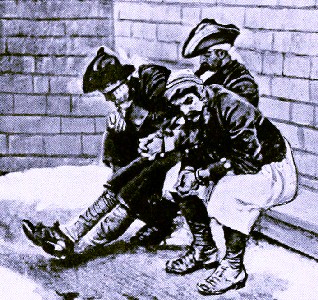
Image: Howard Pyle
The Pirate's Christmas (1893)
pound, which was picked out of all the rest, for the officers having the first choice always, nothing was left for the poor men but the surloin next to the horns, and they have Hobson's choice ['that or noe']"6
In a similar vein, he vents his ire about Christmas aboard the Augustine naval vessel in 1661, which bears repeating in full just to appreciate the magnificent variety and quality of his complaints:
We had but small Christmas cheer, not having Christmas pie or roast beef or plum 'podich' [pudding] and suchlike, I remembering that the poorest people in all England would have a bit of something that was good on such a day, and that many beggars would fare much better than we did; for all we had nothing but a little bit of Irish beef for four men, which had lain in pickle two or three years and was as rusty as the Devil, with a little stinking oil or butter, which was all colours of the rainbow, many men in England greasing their cartwheels with better; and also we had not two or three days to play in and go where we would, as the worst of servants had in England, but as soon as we had ate our large dinner, which was done at three or four mouthfuls, we must work all the day afterward, and maybe a great part of the night, which made me many times to put in consideration what a hard task I had taken upon me for my lifetime...7
Apparently not everyone felt the spirit of Christmas while serving on a ship in the navy. (Barlow could give the Grinch lessons!)
A more dire Christmas situation was the one of the crew of HMS Wager, which was a part of George
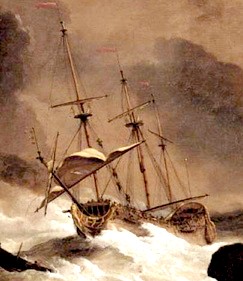
The Wreck of the Wager (1828)
Anson's Pacific expedition in 1740. The Wager was separated from Anson's fleet when rounding the Horn in May of 1741 and wrecked off the coast of Western Chile. Upon wrecking, several of the crew broke into the spirit room and got drunk, dressing up in the officer's clothing. Many of these men drowned when the ship bilged. About 140 men made their way to the island on which the Wager had struck (which would subsequently be named Wager Island).
While there, discipline broke down, fighting ensued and eventually the survivors split into two groups; 82 men took small boats with the goal of returning to England while 20 men remained on the island.8 It is here that we find the small group on Christmas "by some of our accounts... but our accounts had been so often interrupted by our distresses that there was no depending upon them."9 For their Christmas dinner, they "were so pinched with hunger, that we eat the shoes off our feet, which consisted of raw seal skin."10 While that was certainly a Christmas dinner to remember, they probably would have been just as happy not to do so. (One can't help but wonder what Barlow would have made of that dinner!)
1 John Baltharpe, The Straights Voyage, or, St. Davids Poem, 1671, p. 31; 2 Baltharpe, p. 73; 3 David Wondrich, Punch, 2010, p. 153; 4 Francis Moore, Vox Stellarum Being an Almanack for the Year of Human Redemption, 1711. cited in Woodrich,p. 154; 5 Moore, p. 153; 6 Edward Barlow, Barlow's Journal of his Life at Sea in King's Ships, East and West Indiamen & Other Merchantman From 1659 to 1703, p. 160-1; 7 Barlow, p. 68; 8 HMS Wager (1739), wikipedia, gathered 11/25/12; 9,10 John Byron, The narrative of the Honourable John Byron, p. 78
Christmas with the Merchant Sailors
Merchant sailors would seem to have more freedom than those in the navy to celebrate the holiday, although there are only a few accounts from this period which even mention Christmas, so it is tough state this with certainty. Captain Thomas Phillips said that aboard his ship Hannibal in December of 1693, his crew "kept Christmas day as merrily as we could; in honour to which each ship fir'd all her guns round"1. Firing guns may seem like an odd way to celebrate, but it was a custom on ships to fire them for exactly that reason.
In 1693, when the merchant vessel Sampson was in Bengal, then Chief Mate Edward Barlow explained that "the place had plenty of good
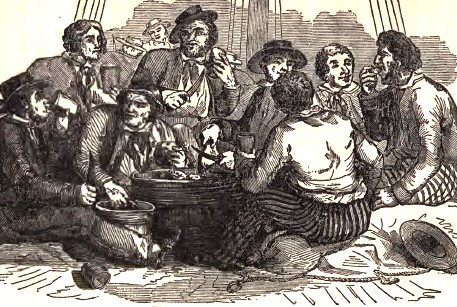
Artist: Robert W. Billings
The Sailor's Mess - Admittedly 100 Years Post-Period - from The American Cruiser's
Own Book by Capt. George Little, p. 45 (1849)
provisions; a good cow for six shillings, and a good hog for half a crown, and a good goose for one shilling, and hens for three halfpence and twopence, and good white rice for a farthing a pound, and green fruits and 'saliting' [salading] at Christmas and all provisions very cheap."2 His attitude either softened over the years or he was just happier being an officer on a merchant vessel.
Of course, the life of a sailor was usually uncertain; not all Christmases could be spent eating, drinking and relaxing. In addition to complaining about the fare at sea, Barlow details his situation while a prisoner of the Dutch during Christmas in 1672 after the East Indiaman Experiment was captured that autumn. Barlow says that "instead of good pies and roast meat, we were content with a little boiled rice and a piece of stinking beef, which they gave us three days in the week, and a quart of stinking water to drink for a day, the weather being exceeding hot."3 Life in an enemy country's prison didn't lend itself to a very merry holiday. Even Barlow can be forgiven for complaining about that Christmas meal.
1 Captain Thomas Phillips, A Journal of a Voyage Made in the Hannibal, 1694, p. 193; 2 Barlow, p. 437-8; 3 Barlow, p. 228
